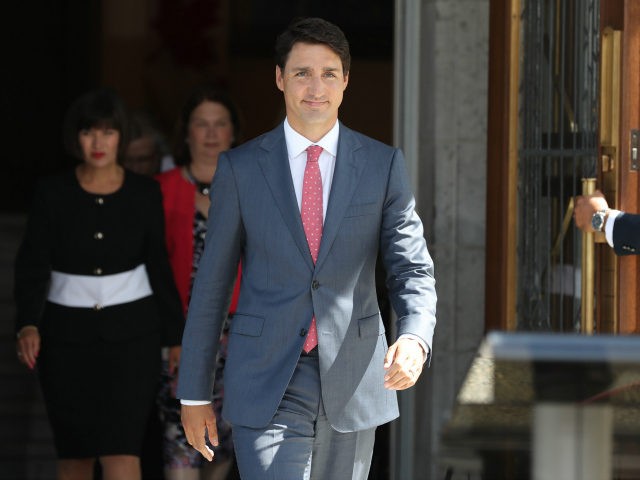Chinese state media are celebrating Canada’s Prime Minister Justin Trudeau for being a “snappy dresser” and challenging U.S. President Donald Trump as Trudeau concludes a two-day trip to the country that reports back home have evaluated as lackluster given that anticipated trade talks were “delayed by further haggling.”
The state-run Global Times publication described Trudeau on Monday as “quite well known among China’s netizens for being a snappy dresser” and maintaining a popular presence on the Chinese social media site Sina Weibo. Trudeau visited the headquarters of the social media network in Beijing on Monday, China Daily reported.
The Times also cited an expert who praised the leftist leader for taking a stand in favor of globalist economic policies.
“Clearly, Trudeau’s administration is not giving way to Trump’s hardline demands, and is pivoting toward China,” Tang Xiaosong, director of the Center for Canadian Studies at Guangdong University of Foreign Studies, told the state-run newspaper.
Chinese government officials also spoke highly of Trudeau and the Chinese bilateral relationship with Canada generally. Foreign Ministry spokesman Geng Shuang told reporters on Monday:
Taking this visit as an opportunity, we stand ready to work with the Canadian side to enhance political mutual trust, deepen practical cooperation, expand people-to-people and cultural exchanges on the basis of mutual respect, equality and mutual benefit, and move forward the China-Canada Strategic Partnership.
“China attaches high importance to developing its relations with Canada,” he emphasized.
Following talks with Trudeau, Chinese Premier Li Keqiang urged Trudeau to help “promote cultural exchanges and successfully run the China-Canada ‘Year of Tourism’ next year,” as well as promising that, to allies like Trudeau, “China will open its door even wider to the outside world.”
“China and Canada, both as important countries in the Asia-Pacific region and major trading countries in the world, should send positive signals on promoting trade and investment liberalization and facilitation, which is also in the common interests of both sides,” Li added.
Trudeau responded, according to the Chinese state-run People’s Daily, that his country “supports free trade and has actively participated in the globalization process” and will continue to do so under his administration.
Following his meeting with the premier, Trudeau met Chinese President Xi Jinping and declared that he sought closer relations with China as a way to oppose “populism or resurgent nationalism” around the world, apparently a swipe at American counterpart President Donald Trump.
“Canada stands strongly as a country that is making a case for international trade that benefits everyone. We will continue to do that,” Trudeau asserted.
What the glowing praise for the talks in Chinese state media omit is that Trudeau and Li did not end up agreeing to preconditions for trade talks that Trudeau himself was supposed to start on this visit. Canada’s Globe and Mail noted that the launch of concrete trade talks this week “was delayed by further haggling.”
CBC noted that Trudeau is leaving his trade minister in Beijing an extra day at the last minute, suggesting Trudeau’s insistence on “gender rights” being part of any trade negotiation has stalled talks. Globe and Mail noted that Trudeau also claimed to have brought up human rights concerns with Chinese leaders. “I brought them up last night – human rights and consular cases – with Premier Li and I will certainly be addressing those issues with President Xi,” he said on Tuesday, after meeting with Xi Jinping.
Bloomberg News referred to Trudeau’s talks Monday as a “false start.” The outlet noted that, while Li and Trudeau offered comments to the press, a joint conference “was scrapped as China and Canada bickered over the format of the event.”
“Chinese officials blocked Canadian media. When Li and Trudeau finally emerged, they gave statements, announced smaller agreements and didn’t launch talks,” Bloomberg added, suggesting Trudeau’s economic agenda was too “progressive” for communist China.
Trudeau ultimately told reporters that he was pleased with the advances in the relationship and that a free-trade agreement was “the next step in the larger framework of [their] partnership.”

COMMENTS
Please let us know if you're having issues with commenting.